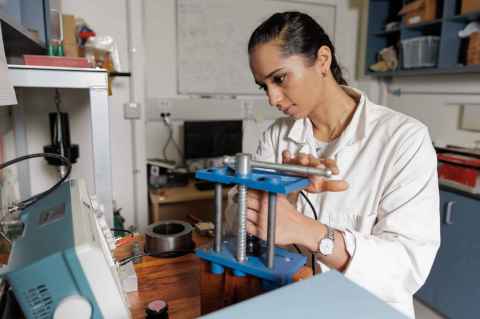Mahima Seth
Mahima is aiming to use her Honours study in physics as a pathway into working for an organization like NIWA, or even NASA, applying an understanding of the principles of our own environment to learning more about the environments of other planets.

Programme: BSc in Physics & Env. Physics, and BSc in Physics (Hons)
Subject: Environmental Physics
“I completed a BSc(Physics/Geophysics) in 2021, and went on to study Physics with Honours. I felt like studying physics was a way to quantitatively understand the world around me. It also was one of the few majors that could eventually lead to studying astrophysics topics.
“Environmental Physics interested me because I was interested in the environmental impact of human activity and how the geology of the surface of earth tells us a story about its past. Additionally, New Zealand is a geologically young and active country, so I hoped I would get to go on a lot of field trips and see a lot of these natural phenomena in person.
“Physics provided me with a solid foundation for learning about the earth, atmosphere, and oceans. I also like that the broad nature of what I study doesn’t restrict me to one industry or job—I feel like I have gained a lot of transferable skills during my study (which aren’t industry specific).
“I hope my Honours study will lead to jobs in institutions such as NIWA or GNS. Ultimately, I would love to work for NASA, taking the skills I have learnt about the Earth from Environmental Physics and applying them to learning more about other planets! But I would be equally happy to take my skills and perspective to an entirely different industry. I did an internship at PwC (Price Waterhouse Coopers) in the Digital Forensics team in the summer of 2021/2022. I really enjoyed that and used a lot of the coding skills I learnt in that role.
“I was recently awarded the Dennis Brown Experimental Physics prize for my work in Physics 390 (Experimental Physics). I didn’t really expect to get this and certainly didn’t go in aiming for it. It was nice to be recognized for my work, and the thing that I appreciated the most about it was that my lecturers valued me for more than my grades alone, and this shows the progressive thinking that I think is the core of science itself.
“I think coming to university was definitely a big change for me after working full time for six years in the Royal New Zealand Airforce. Ultimately, I think I gained a lot more than Physics knowledge from my time here—I learned a lot about myself, my weaknesses, my strengths, and even my academic interests (which I thought I already knew when I started). I felt that if I reached out to my lecturers with a genuine issue, that they would help me and they would understand. This really took a lot of the stress out for me over the last couple of (unpredictable) years.”
We're always looking for stories to share from our passionate Science students.
If you have a story, we'd love to hear from you. Email science-web@auckland.ac.nz.